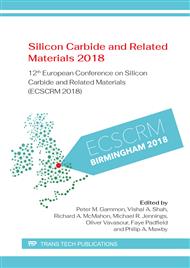p.562
p.567
p.572
p.576
p.583
p.588
p.592
p.596
p.600
Comparison of SiC MOSFET Characteristics Following Body-Diode Forward-Current Stress
Abstract:
The effect of forward-current stress of the body diode on the operating characteristics of various commercially-available SiC power MOSFETs was compared. The one set of recent-vintage second-generation 1200-V devices studied showed no degradation at all when the body diode was forward conducted—either in the body diode or the MOSFET characteristics. This is a distinct improvement from first generation 1200-V devices from various suppliers. This degradation phenomenon was consistent with the formation of stacking faults during current stress, which typically reduced MOSFET conductivity, and in some devices increased the Off-state leakage current. Although first-generation 1700-V MOSFET characteristics showed no degradation of the body diode, they did experience a degradation of the blocking voltage due to charge trapping during the stress.
Info:
Periodical:
Pages:
583-587
DOI:
Citation:
Online since:
July 2019
Authors:
Price:
Сopyright:
© 2019 Trans Tech Publications Ltd. All Rights Reserved
Share:
Citation:


